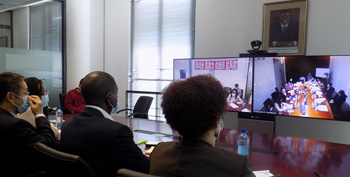
Ensuring future growth and sustainability in challenging times
Like all stakeholders in the international oil and gas industry, ship repair company, Elgin Brown & Hamer (EBH) Namibia, the only operator of the two synchrolifts in Walvis Bay, has been closely tracking the sliding oil price since it dropped to below US$ 80 per barrel in late 2014
In anticipation of the ‘lag effect’ of the sustained low oil price on the downstream oil and gas industry, and a very evident reduction in vessel dry docking requests, EBH Namibia took a proactive stance in March 2015 by adopting a series of stringent performance improvement plans (PIPs).
For CEO, Hannes Uys, it was critical for the company, at that time, to examine its efficiencies in all areas of the business, reducing costs and making efficiency improvements in systems such as procurement. The plan, according to Uys, has yielded significant savings for EBH Namibia.
“When you are in a depressed economic cycle, as we are now, it is important to ‘scan and scale’ the entire business, interrogating ways in which to build efficiencies and review resources, while conducting due diligence, assessing reserves and tracking industry trends closely,” said Uys.
“While we started our formal PIP interventions in early 2015, continuous improvement is an ongoing strategy at EBH Namibia, as it feeds into our overall strategy to ensure future sustainability and growth in market share, and is part of our strategy as a responsible and invested corporate citizen of Namibia,” he added.
The proactive and cost-cutting steps taken notwithstanding, EBH Namibia, whose core focus is the downstream offshore supply vessel repair market, has recently experienced a 50% decline in docking activity.
The company first felt the ‘lag effect’ of the sustained drop in oil prices during November 2015, which was a few months later than initially anticipated.
“We first and foremost addressed the non-human resources (HR) aspects of the business as strategically and effectively as possible in 2015. However, we are now in a position where the sustained effect of the low oil price on production along the west coast of Africa, and in particular our core market, Angola, led to a 50% net loss in revenue, which in turn forced us to embark on a company-wide restructuring and stabilisation programme,” said Uys.
Although every effort has been made to ensure that the situation affects the least number of employees as possible, the situation has unfortunately necessitated the retrenchment of some full-time employees of EBH Namibia.
“It has been very difficult to generate positive cash flow in an industry that is going through one of its worst downturns in history,” said Uys.
“These are tough, but necessary measures which we are putting in place, in order to maintain and strengthen EBH Namibia’s competitiveness during a very challenging time in our industry.”
“I would like to assure all our stakeholders that the management of EBH Namibia will follow due process and comply with all legislative requirements,” he added.













































